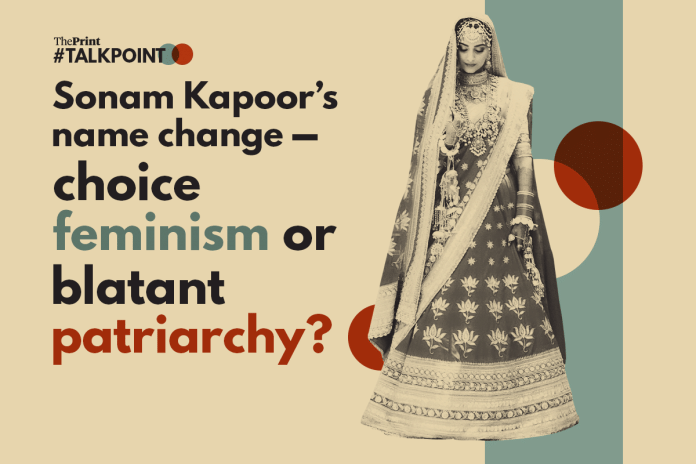Sonam Kapoor, now Sonam Kapoor-Ahuja, has come under fire from feminists for taking on her husband’s surname.
ThePrint asks: Sonam Kapoor’s name change – choice feminism or blatant patriarchy?
What is not feminist is taking away a woman’s choice to do what she wants with her life
 Neera Majumdar
Neera Majumdar
Journalist, ThePrint
Is taking up your husband’s last name patriarchal? Yes.
Is keeping your own last name patriarchal? Yes. Because it is your father’s last name.
Is taking up your mother’s last name patriarchal? Yes. Because it is her father’s last name.
The point here is that one’s last name is already the outcome of a casteist and patriarchal society, whether or not you are married.
It is easy to view feminists as one large group that must think alike, do alike, feel alike, and not question each other. But in reality, we question ourselves all the time. There are social feminists, Marxist feminists, radical feminists and every other mix of feminists, all of whom argue with each other a lot. Feminism does not exist in binaries — you can be a feminist and change your name. You can be a feminist and want to have children. You can be a feminist and like pink.
Today’s feminists exist and dabble in multiple identities and circumstances. None of us started with a clean slate where patriarchy, caste, class does not exist (not even the Amazons). Therefore there is a need to negotiate our identities, acknowledge our privileges, and empower others. We will not be able to let go of all our social conditioning in one go, it is a lifelong process. We have to pick our battles daily.
If Sonam Kapoor wants to change her name after marriage, so be it. What is not feminist is taking away a woman’s choice to do what she wants with her life. That’s what patriarchy has done for so long.
More than the action itself, the speed was disappointing
 Sandhya Ramesh
Sandhya Ramesh
Senior assistant editor, Science, ThePrint
We all have our own versions of feminism. We struggle to find a balance between its extreme forms — of removing every single indicator or tiny root that either stems from or perpetuates patriarchy — and resting at legally having the same rights as men. Most people with informed views have opinions that lie somewhere in the middle.
Changing one’s last name to reflect the family name is a practice that has evolved over generations and is massively convenient. If an updation is needed, it requires a ton of nuanced debate.
Changing her last name was Sonam Kapoor’s choice. But the speed at which she did so, less than 24 hours after her wedding, and the place where she first did so, her Instagram profile, with millions of teenage and young adult followers, didn’t sit well with me personally. It isn’t just a simple name-change in today’s online era. As anyone on any social network would agree, a username is a symbolic representation of an individual’s core identity.
More than the action itself, the intention to instantaneously change it to adhere to existing norms was disappointing to me.
In today’s world, where women are rapidly scaling new heights and fighting tooth-and-nail to break out of the shackles of sexism, icons like Sonam Kapoor are people several young adults look up to. To young women fighting to establish their own identity, her decision amounted to a role model deciding to tie her unique identity to a man’s.
Perhaps what was worse to me was her beautiful cake’s distasteful wedding topper. The woman who stands out from everyone else for her style chose to go with a stereotypical, offensive figurine of a married woman dragging her new man away from something he loves (basketball).
Stars like Sonam Kapoor could maybe do wonderfully well as feminist role models for young men and women alike. But alas, Bollywood repeatedly reinforces in us, through big actions (no #MeToo voices despite incessant hushed talks) and small, that gender equality and notions of feminism are yet to reach even middle-class-level sensibilities.
I can no longer expect Mrs Kapoor-Ahuja to shatter the glass houses of our male chauvinist society when she herself lives in one
 Nikhil Rampal
Nikhil Rampal
Journalist, ThePrint
The ‘choice feminism’ seen among Indian women is unique to them. The reason? I will blame it on the “women-sacrificing- everything” culture and festivals that promote male chauvinism.
Feminists across the world are fighting for equal rights, equal pay, equal representation and, of course, freedom of choice, but Indian feminists beg to differ. The choice feminists in India are somewhat like Jennifer Lopez’s ‘Ain’t Yo Mama’; women are cherry-picking their choices while they are still ‘in the hood’ of feminism. It’s like eating an egg or tasting the mutton gravy, while proclaiming to be a vegetarian.
I remember, in my school, some girls didn’t have a second name because they said it became a problem after marriage. I was 10 years old at the time, couldn’t understand it, but now I realise that girls, right from their childhood, are trained to be good wives and daughters-in-law just to please society. Of course, ‘feminism’ to those women is only limited to celebrating 8 March, being able to smoke, drink and work outside the house.
Sonam Kapoor’s name-change will definitely hurt the sentiments of India’s real feminists. I can imagine how, in some households where the women refused to change their name, the husbands must be telling their wives: “Sonam Kapoor ne bhi kar liya, tumko pata nahin kya dikkat hai.”
It will make these women feel sad, and defeat their belief that change begins with one person.
From now on, I can’t expect Mrs Kapoor-Ahuja to shatter the glass houses of our male chauvinist society when she herself lives in one.
One question for Sonam Kapoor – Why not ask your husband to change his name as well?
 Deeksha Bhardwaj
Deeksha Bhardwaj
Journalist, ThePrint
“We live in a time marked with instability and upheaval and as a proud and unapologetic feminist, I’m thankful for that every day because stability would mean regressing to the time when a ‘women’s place’, in the household, in the workplace and in the world was determined by the narrow prejudicial constructs of the society and those who claimed to be its vanguards (sic).”
This is what Sonam Kapoor wrote on 8 March 2017. In just one year’s time, she seems to have changed her opinion. Weddings as a structure are entrenched in patriarchy. The entire concept of a ‘mangal sutra’, ‘sindoor’, all forms of marking and branding women as property, is bad enough.
But to change one’s name? It’s not only an archaic, patriarchal practice, but also impractical. Names are the first marker of one’s identity. To have to change that because you married someone is a denial of a woman’s very personhood. It is a statement that women have no identity except the ones that are formed vis-a-vis their relationship with men.
The bureaucratic process that accompanies a name-change — the passports, the bank details — are not even factored into this argument. There is no space for rationality when it comes to patriarchy, anyway.
For someone who claims to believe in equal opportunity, I have one question for Sonam Kapoor. Why not ask your husband to change his name as well? Where is the gender parity in only Sonam changing her name. Why has the woman who claimed to be a non-conformist succumbed to societal pressure, that too so quickly?
It is up to our generation of feminists to actually ensure that we can break out of this vicious cycle of women moving from their father’s to their husband’s house.
Sonam Kapoor is one of the few Bollywood celebrities who has always advocated taking a stand. There may be a hyphen in her name and she may have ‘chosen’ to change it. Either way, like the Victorian heroines of Jane Austen’s novels, she has inevitably given way to the same “narrow prejudicial constructs of the society and those who claimed to be its vanguards” without changing the narrative.
Alienating Sonam Kapoor from the feminist cause is short-sighted
 Nandita Singh
Nandita Singh
Journalist, ThePrint
If Sonam Kapoor wanted to avoid doing anything remotely patriarchal, she wouldn’t have gotten married in the first place.
The entire institution has developed out of a man’s need to control a woman’s sexuality so that he can identify his ‘rightful’ male heir and pass down private property.
Then there’s the God-awful conundrum of ‘deciding’, assuming you have the agency, whether you want to become a mother. I mean, why would you want to play right into the nurturing stereotype and do that to your body at the same time?
Look at it this way: Wasn’t Sonam Kapoor’s decision to lose weight and subscribe to the conventional standards of beauty an equally patriarchal thing to do? What’s in a surname when you’ve already moulded your entire life and identity around expectations? She can’t possibly be a feminist when every decision she makes is already being guided by misogynist conditioning.
That’s the entire point – she can be. Because you can be a feminist despite accepting submissive sexual roles. Because you can be a feminist even if you have a white-picket-fence-and-two-babies-after-marriage dream. No decision we make is borne of absolute ideology; we are and will continue to be pulled in different directions by myriad factors.
If ‘choice’ itself is determined within patriarchal frameworks that condition us at the core (like Hadiya’s father argued that she can’t possibly know any better because she’s been brainwashed), then, technically, none of us can be feminists.
The line that divides the two is understanding why you’re doing what you’re doing, and then honestly going ahead and making up your own mind. Sonam Kapoor can influence young girls more by the films she chooses, the stands she takes, and choosing to speak up against injustice, even within her own elite fraternity, than by her decision to change her name on Instagram. Alienating her from the feminist cause is short-sighted: Hold her accountable for the war, not the battle.
It’s still a relatively rare practice for women to retain their surname after marriage
 Sharanya Munsi
Sharanya Munsi
Web Editor, ThePrint
Bollywood actress Sonam Kapoor’s wedding was the ultimate social media ‘like’ magnet. From the dress to the wedding cake, she has been blessed from her followers’ hearts in her new journey. But the hard-to-please sceptics are still turning up their nose at Sonam’s choice to change her name to adopt her husband’s surname.
As someone who claims to be a “complete feminist”, she was expected to shatter patriarchal traditions and stick with her maiden name.
But the question remains: Does not taking your husband’s name make you a revolutionary? For a closely controlled patriarchal society like India’s, feminists would say yes. This is why Sonam did so too.
But she seems to have taken the middle path, choosing to stoke neither conservatives nor feminists by toeing the grey line. The 36-year-old actress has followed the lead of Kareena Kapoor-Khan, Aishwarya Rai-Bachchan, and Shilpa Shetty-Kundra to become Sonam Kapoor-Ahuja.
It’s still a relatively rare practice for women to retain their surname after marriage: Bollywood offers only a few such examples; Kiran Rao, Shabana Azmi, Vidya Balan, and Kalki Koechlin, among others. Their choice came as no surprise, as these are women who have bucked convention in their careers as well.
Had Sonam Kapoor chosen to stick to her maiden name, it would have added credit to her claim of being a feminist. However, for now, her claim seems to have fallen through.







Was this question ever asked by these “feminists” when Karina Kapoor’s name was changed to Karina Kapoor Khan? Oh! I forgot that these “feminists” are “seculars”, too, and, their outrage is only reserved for those women whose changed last name is not from the ROP or ROL communities! What a waste of time and space for everyone involved in even discussing this trivial issue! If Sonam Kapoor doesn’t have a problem, why these are?